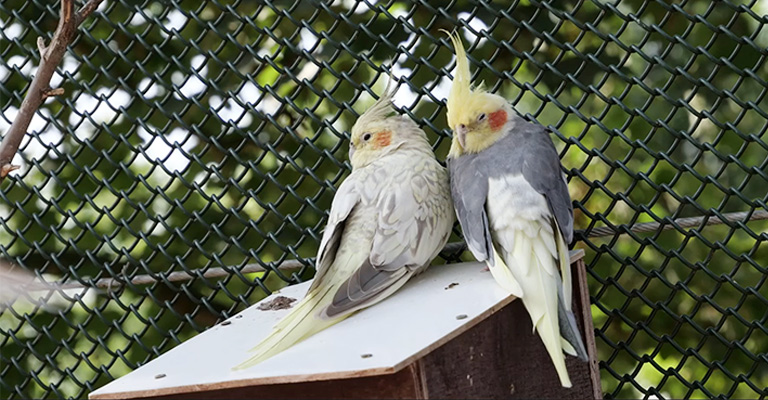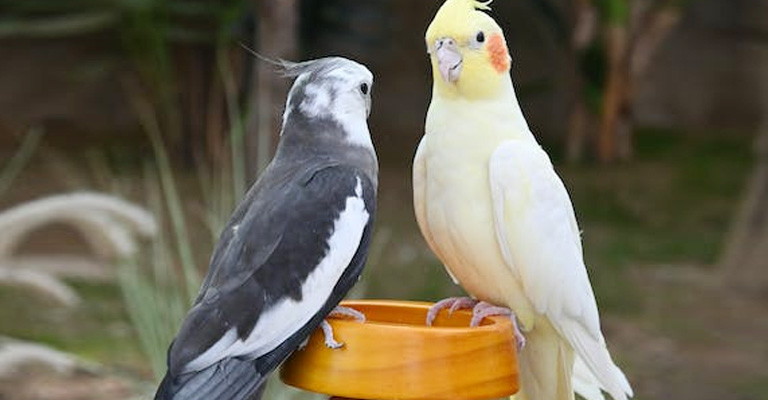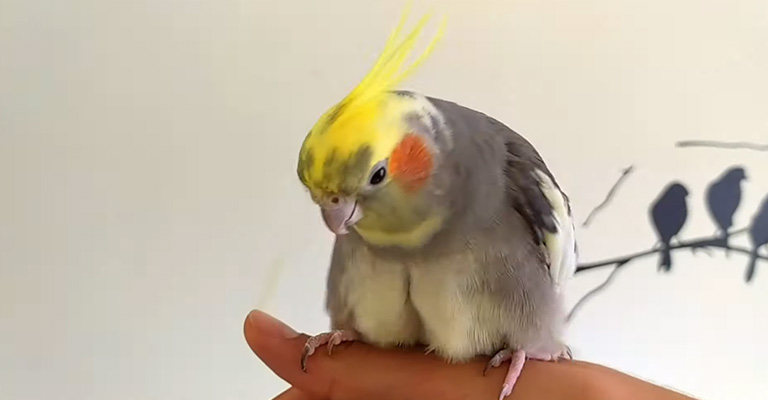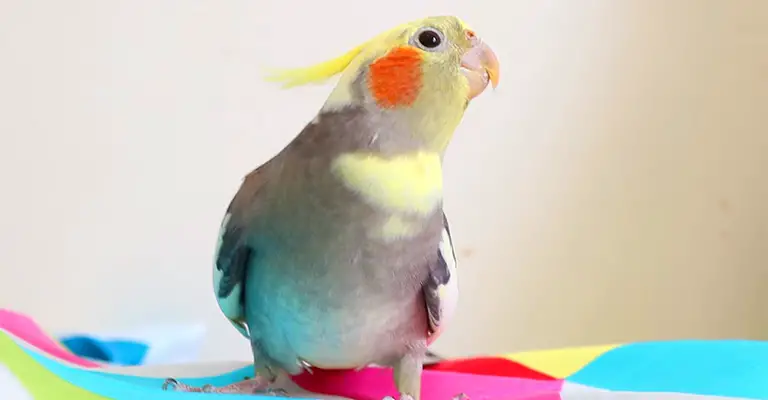Cockatiels, popularly known for their charming appearance and delightful personalities, are beloved pet birds that bring joy and companionship to countless households.
However, one behavior exhibited by these feathered friends may puzzle their owners: the act of eating their feces, known as coprophagy.
“Why do cockatiels eat their poop?” This question has intrigued avian enthusiasts and concerned pet owners alike, prompting a quest to understand the reasons behind this behavior and seek practical solutions.
In this article, we will delve into the intriguing world of cockatiels and explore the phenomenon of coprophagy.
By unraveling the motivations and mechanisms behind this behavior, we aim to shed light on why cockatiels engage in coprophagy, highlight the potential health implications, and provide insights into preventing or addressing this behavior.
Understanding the reasons behind coprophagy in cockatiels is vital for the well-being and happiness of these beloved avian companions.

Why Do Cockatiels Eat Their Poop?
Cockatiels eating their poop, known as coprophagy, can be observed for several reasons. While it may seem strange to us, it is a relatively common behavior in these birds and serves specific purposes.
Here are a few possible reasons why cockatiels engage in coprophagy:
Nutrient Reabsorption
Cockatiels have a unique digestive system designed to extract nutrients from their food efficiently. When they consume their droppings, they can reabsorb any undigested nutrients that may still be present.
This behavior allows them to extract maximum nutrition from their food and maintain a balanced diet.
Gut Microbiome Development
Young cockatiels may eat their droppings to acquire essential gut bacteria. By consuming the feces, they introduce these beneficial microorganisms back into their digestive system, which aids in the digestion and absorption of food.
This behavior helps establish a healthy gut microbiome, especially in young birds still developing immune systems.
Behavioral Instincts
Coprophagy is also observed in some wild bird species to prevent predators’ detection of their presence. By consuming their droppings, they reduce the chances of leaving a visual or olfactory trail that could attract predators.
Although cockatiels kept as pets are not under the same predatory threats, this behavior might still be instinctual and carried over from their wild counterparts.
Environmental Cleanliness
Cockatiels are generally clean birds and may eat their droppings to maintain hygiene in their immediate surroundings. By consuming their waste, they minimize the accumulation of fecal matter in their living space, which can help prevent the spread of bacteria or parasites.
It’s worth noting that while coprophagy is generally harmless and natural for cockatiels, excessive or persistent consumption of droppings could indicate an underlying health issue or nutritional deficiency.
If you notice any concerning changes in your cockatiel’s behavior or health, it’s advisable to consult with an avian veterinarian for a proper evaluation and guidance.
When Do Cockatiels Engage In Coprophagy?

Cockatiels engage in coprophagy at various stages of their lives and in response to certain environmental factors. Understanding these specific situations can help bird owners identify the reasons behind this behavior and take appropriate measures to address it.
Nestling Stage
During the nestling stage, when cockatiels are cared for by their parents, they may consume their feces. This behavior is believed to be an instinct, as it helps maintain cleanliness within the nest and reduces the risk of attracting predators.
Weaning Process
Coprophagy commonly occurs during the weaning process when cockatiels are transitioning from a primarily liquid diet to solid foods. As they explore and taste different foods, they may inadvertently consume their droppings.
During Hormonal Changes
Cockatiels may engage in coprophagy during hormonal changes, such as breeding season or sexual maturity. Hormonal fluctuations can trigger behavioral changes, including the consumption of feces.
In Response To Environmental Factors
Environmental factors such as overcrowding, lack of stimulation, or stressful situations can lead cockatiels to resort to coprophagy as a coping mechanism. It may serve as a self-soothing behavior or a response to boredom.
How Does Coprophagy Affect Cockatiels?

Coprophagy, the behavior of eating their droppings, can positively and negatively affect cockatiels. Here are some ways coprophagy can impact these birds:
Nutrient Recycling
By consuming their droppings, cockatiels can reabsorb any undigested nutrients that may still be present in their feces. This can help maximize their nutritional intake and ensure they obtain essential vitamins, minerals, and other nutrients.
Nutrient recycling through coprophagy can be beneficial, especially when food resources are limited or during increased nutritional demands, such as breeding or molting.
Gut Microbiome Health
The gut microbiome refers to the community of beneficial bacteria and microorganisms in the digestive system. Consuming their droppings allows cockatiels to reintroduce these beneficial bacteria into their gut, promoting a healthy microbiome.
A balanced gut microbiome is essential for proper digestion, nutrient absorption, and overall immune system function.
Parasite Transmission
One potential downside of coprophagy is the possible transmission of parasites. If a cockatiel has internal parasites or pathogens in its droppings, consuming them can lead to reinfection or spreading of harmful organisms.
This is why maintaining proper hygiene and regular veterinary check-ups are essential to minimize the risk of parasite infestation.
Behavioral Issues
In some cases, coprophagy can become a compulsive or excessive behavior. Cockatiels that engage in prolonged or persistent coprophagy may develop behavioral issues or exhibit abnormal feeding patterns.
This can indicate underlying stress, boredom, or nutritional imbalances. If coprophagy becomes problematic or interferes with the bird’s overall well-being, addressing the underlying cause and providing appropriate behavioral enrichment and dietary adjustments is essential.
Monitoring your cockatiel’s behavior, droppings, and overall health is crucial. If you have concerns about coprophagy or notice any unusual changes in your bird’s behavior or health, consult an avian veterinarian.
They can assess your cockatiel’s situation and guide you to ensure their well-being.
Strategies To Minimize Or Prevent Coprophagy

Coprophagy in cockatiels can be a concerning behavior with various underlying reasons. However, several practical strategies can help minimize or prevent coprophagy in these birds.
By implementing the following measures, you can promote healthier habits and overall well-being for your cockatiel.
Providing A Balanced Diet
One of the critical factors in preventing coprophagy is ensuring your cockatiel receives a balanced and nutritious diet. This can be achieved through the following approaches:
High-Quality Pellets and Fresh Foods:
Offering high-quality pellets formulated explicitly for cockatiels ensures they receive essential nutrients. Additionally, providing a variety of fresh fruits, vegetables, and leafy greens helps enrich their diet and satisfies their natural foraging instincts.
Nutritional Supplements:
In some cases, nutritional deficiencies may contribute to coprophagy. Consult an avian veterinarian to determine if your cockatiel requires specific supplements, such as calcium or vitamin supplements, to address any weaknesses and improve overall health.
Environmental Enrichment:
Creating a stimulating and enriching environment for your cockatiel can help alleviate boredom and prevent coprophagy. Consider the following strategies:
Toys and Foraging Activities:
Provide a range of toys, such as puzzles and foraging, to engage your cockatiel mentally and physically. These toys encourage natural behaviors and prevent boredom, reducing the likelihood of coprophagy.
Social Interaction and Training:
Cockatiels are social birds that thrive on interaction. Spend quality time with your bird, offering attention, affection, and mental stimulation. Training sessions can also help redirect their focus and energy towards positive behaviors, reducing the occurrence of coprophagy.
Veterinary Care And Regular Health Checks:
Regular veterinary care is crucial in maintaining your cockatiel’s health and identifying any underlying issues contributing to coprophagy. Consider the following steps:
Identifying Nutritional Deficiencies:
Schedule regular check-ups with an avian veterinarian who can assess your cockatiel’s overall health and identify any nutritional deficiencies.
Blood tests may be conducted to determine if any imbalances need to be addressed through dietary adjustments or supplements.
Treating Underlying Medical Conditions:
Coprophagy may sometimes be associated with underlying medical conditions. A thorough examination by an avian veterinarian can help identify and treat any digestive issues, infections, or hormonal imbalances contributing to this behavior.
Consistent Cage Cleaning And Waste Management:
Maintaining a clean and hygienic living environment for your cockatiel is essential in discouraging coprophagy. Consider the following practices:
Removing Waste Promptly
Regularly clean the cage, removing droppings promptly to prevent your cockatiel from engaging in coprophagy. This will also help maintain a healthier and odor-free environment.
Using Proper Litter and Bedding Materials
Choose appropriate bedding materials that are absorbent and easy to clean. Avoid using materials that may encourage coprophagy, such as certain types of paper or fabric.
By implementing these strategies, you can promote a healthier and more enriching environment for your cockatiel, reducing the likelihood of coprophagy. Remember, patience and consistency are key when addressing and modifying any behavioral issues in your feathered friend.
FAQs
While it may seem unappealing, coprophagy is generally not harmful to cockatiels. However, monitoring their overall health and ensuring a balanced diet is essential.
Consulting a veterinarian is crucial to rule out any underlying health issues. Blood tests can help identify any deficiencies contributing to the behavior.
Yes, stress and boredom can trigger coprophagy in cockatiels. Providing mental and physical stimulation, such as toys and social interaction, can help alleviate these factors.
A balanced diet is essential but may not be the sole solution. Other environmental and behavioral factors should also be considered and addressed.
If the behavior persists or you notice any other concerning symptoms, you should consult a veterinarian for a thorough examination.
Conclusion
Cockatiels eating their poop, while unusual to us, can have various underlying causes. Nutritional deficiencies, instinctual behavior, environmental factors, and stress or boredom can all contribute to coprophagy in cockatiels.
Addressing these factors through a balanced diet, environmental enrichment, regular exercise, and seeking veterinary advice can help minimize or resolve this behavior.
Remember, monitoring your cockatiel’s overall health and well-being is crucial to ensure a happy and thriving feathered companion.